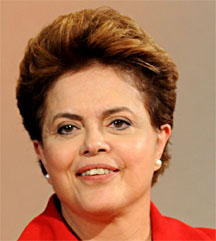BRASILIA, (Reuters) – President Dilma Rousseff wants to regulate strikes by public workers after a series of walkouts by civil servants in recent months paralyzed public services across Brazil.

But the plans, in proposals that could soon be presented to Congress, are drawing fire from unions and labor activists – a constituency that helped put Rousseff into office and that long has formed the bedrock of the ruling Workers’ Party.
The strikes that started in May by civil servants, ranging from university professors to customs and health inspectors to Brazil’s federal police force, so crippled public services that Rousseff wants to better define who can strike and when, and establish collective-bargaining mechanisms to head off future stoppages.
“The 1988 Constitution guarantees the right to strike, but no law was adopted to implement that right,” said Sergio Mendonca, the civil service labor relations secretary, in an interview. “We’re not just going to consider strikes but also dialogue, because the government is not shutting out dialogue.”
The plan has angered union bosses, who accuse the president of turning her back on the labor movement that helped put the leftist Workers’ Party in power in 2003.
“Our agenda is being overlooked in favor of the agenda of the business class,” said Vagner Freitas de Moraes, head of CUT, an umbrella group that represents over 7 million union workers, including 770,000 federal government employees.
“President Dilma should watch out for the interests of the working class, especially those sectors of the working class that provided the political support for her to come to office,” Moraes told Reuters.
The four-month wave of strikes at universities and gradually crippled other federal offices, including the central bank, the tax-collection office and the national statistics agency. Brazil’s already congested airports and ports faced greater delays, medicine imports stalled and fertilizer supplies crucial to grain exports sat for weeks off-shore on ships waiting to dock.
Mendonca said police and other armed forces could have their right to strike restricted by the government’s plans, possibly requiring them to hand over their weapons when they walk out.
While details are still being worked out, Mendonca said the new regulations will establish which workers can strike, as well as when and how, so that their stoppages do not hurt the public interest. Health workers, for example, might be required to always have a skeleton staff on duty so urgent care is not disrupted.
In a tense moment during the recent stoppages, striking policemen clashed with military police outside the president’s office and were dispersed with tear gas. Protesters erected barricades outside ministry buildings.
Unions are particularly miffed at Rousseff because her predecessor and mentor, former President Luiz Inacio Lula da Silva, built the Workers’ Party around his past as a labor leader and icon of the country’s massive working class.
Things have changed since Lula was in office, though.